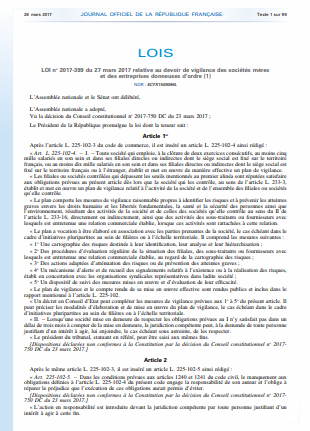French Law on the Corporate Duty of Vigilance
According to the law, all companies headquartered in France and employing more than 5,000 employees in France, or headquartered in France or abroad and employing more than 10,000 employees worldwide, must set up vigilance plans. A vigilance plan “includes reasonable vigilance measures to identify risks and prevent serious violations of human rights and fundamental freedoms, health and safety of persons and environment resulting from the activities of the company and of the companies it controls, either directly or indirectly, as well as the activities of subcontractors or suppliers with whom an established business relationship is maintained.”
The content of the plan as defined by the law includes:
- Risks mapping intended for their identification, analysis, and ranking;
- Procedures for the assessment on a regular basis of the situation of subsidiaries, subcontractors, or suppliers with whom an established commercial relationship is maintained, taking into account the risk mapping;
- Adapted actions to mitigate risks or prevent serious harm;
- A mechanism for alerting and collecting alerts on the existence or the realization of risks, drawn up in consultation with the representative trade union organizations in the said company; and
- A mechanism for monitoring the measures implemented and evaluating their effectiveness.
Click here to view the online legislation.

